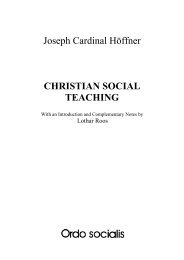Prof. Franz Josef Stegmann Bethlehem Social ... - Ordo Socialis
Prof. Franz Josef Stegmann Bethlehem Social ... - Ordo Socialis
Prof. Franz Josef Stegmann Bethlehem Social ... - Ordo Socialis
You also want an ePaper? Increase the reach of your titles
YUMPU automatically turns print PDFs into web optimized ePapers that Google loves.
<strong>Stegmann</strong><br />
The guidelines are liberty, justice, peace and reconciliation. In this way, some selfishness and<br />
“ideologisation” of a political or other kind, often not malicious, could be avoided. Such a<br />
"critical unrest function" is important, even if the essence of being a Christian does not, of<br />
course, only consist in being an “unrestful critic of society".<br />
2.4 Removal of inhuman social conditions<br />
The Gospel of St. Luke tells the famous story of the Good Samaritan (see Lk 10.30-37).<br />
While travelling from Jerusalem to Jericho, a man was attacked by robbers and left half dead<br />
on the road. Neither a passing priest nor a levite on his way stopped to care for the injured<br />
man, but a man from the pagan Samaria did. The moral of this story may be applied to many<br />
social situations of similar kind.<br />
The Encyclical Quadragesimo Anno, published in 1931, states that often "conditions of<br />
economic and social life are such as to create for vast multitudes of souls very serious obstacles<br />
in the pursuit of the one thing necessary, their eternal salvation". 20<br />
Although both statements aim at different goals, they agree in the following way: whenever<br />
people are in great distress, whenever – generally speaking – social or political conditions<br />
obviously and seriously contradict a humane order of society, biblical revelation and Christian<br />
faith directly and in concrete terms demand the removal of such inhuman conditions.<br />
Christians must not be passive in situations in which human dignity and basic human rights<br />
are trampled on. In cases such as this, the biblical message makes a clear political or economic<br />
demand. To use the same metaphor, the man beaten by robbers must not bleed to death,<br />
whether he suffers in a Latin American favela, in a South African township, in a camp for<br />
Congolese refugees, or is on his way from Jerusalem to Jericho.<br />
The Gospel, however, does not prescribe what to do or how to help: ie, whether the helper<br />
should take the injured individual to the nearest inn, patch him up on the spot or help him in<br />
some other way. Jesus also does not prescribe how the helper can ensure that the man is not<br />
attacked again when returning from Jericho; i.e., the Gospel does not state how the "structure<br />
of robbery" is to be removed – all these decisions depend on one's knowledge of facts.<br />
Christian revelation, the commandment to love one's neighbour and the demand of solidarity<br />
ask of Christians that they are committed to shaping a humane life for human beings. But each<br />
person must acquire the knowledge of political, economic and other facts for himself/herself.<br />
In order to do so, political information and economic knowledge are imperative.<br />
3. CHRISTIAN UNDERSTANDING OF THE HUMAN BEING AS A PERSON<br />
Jesus did not proclaim a new economic programme, and the Gospel is not a political prescription.<br />
The Christian message, however, includes general guidelines and ideas for shaping<br />
a humane social order. This leads to Christian <strong>Social</strong> Teaching in the stricter Sense and, in<br />
particular, to the Christian understanding of the human being, which forms the basic and core<br />
of this social teaching.<br />
Pope John XXIII draws attention to the starting point in his Encyclical Mater et Magistra,<br />
published in 1961:<br />
"Individual human beings are necessarily the foundation, cause, and end of all social<br />
institutions".<br />
20 Pius XI, After Forty Years‐Quadragesimo Anno (1931), 130.<br />
12















